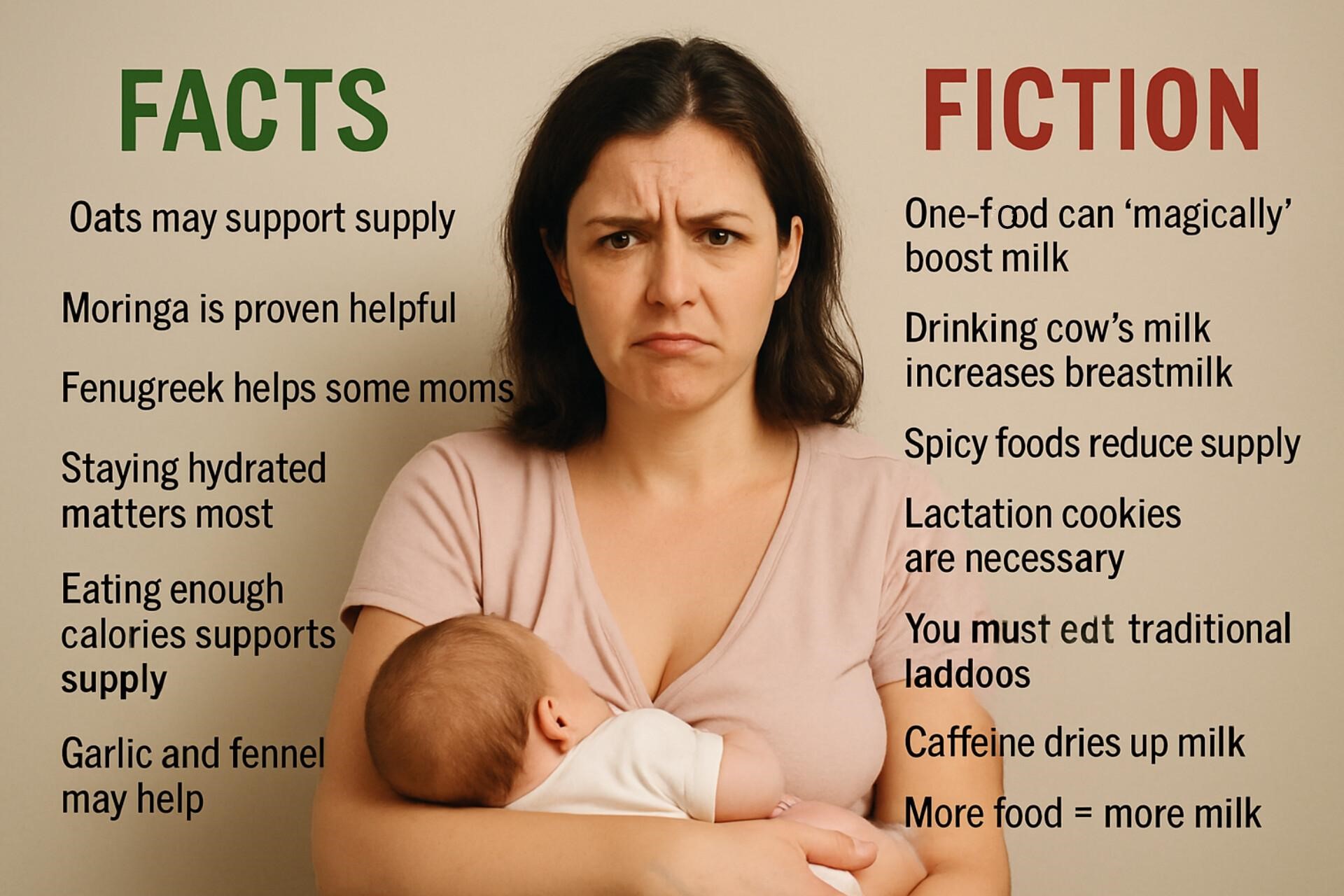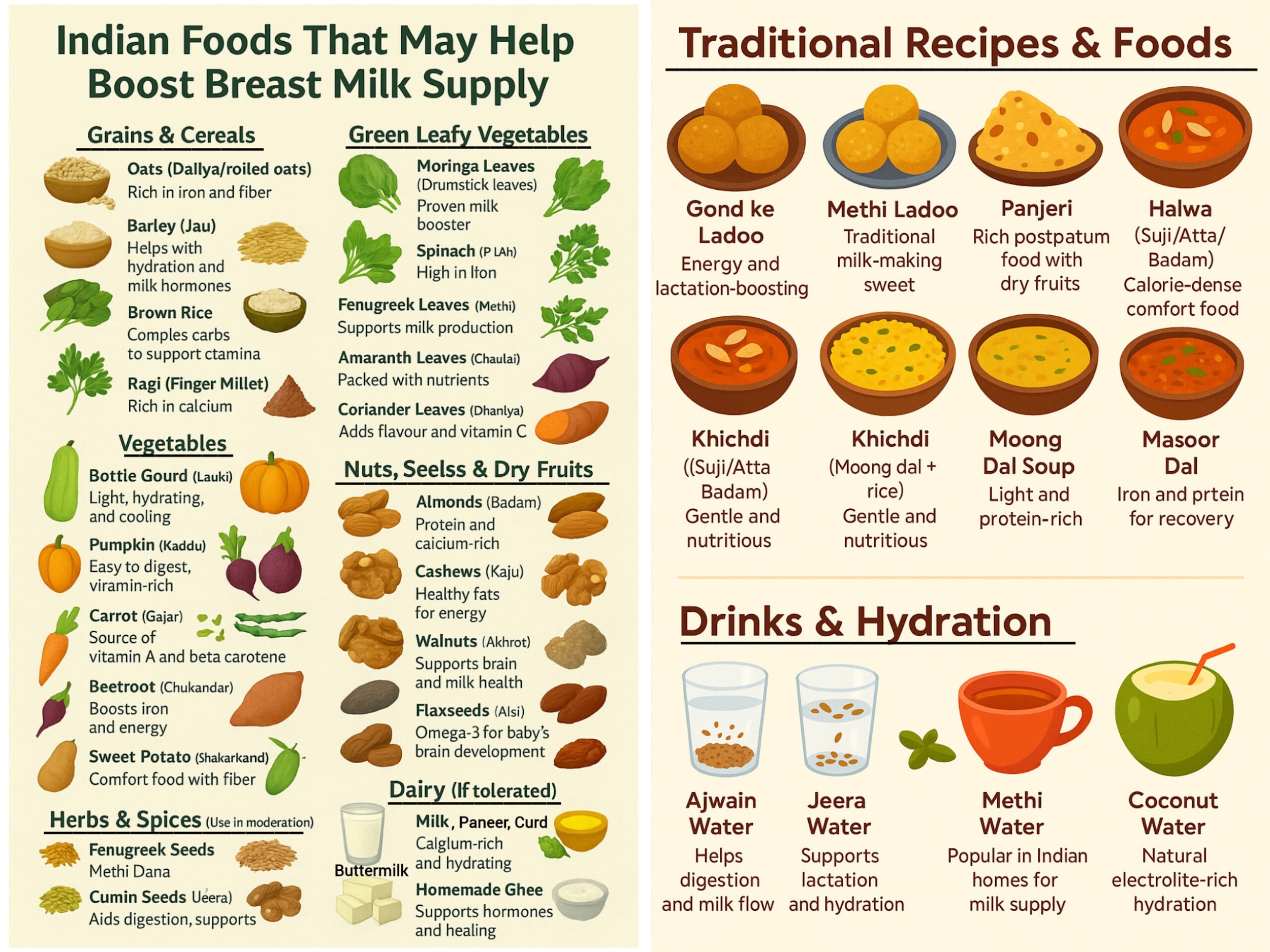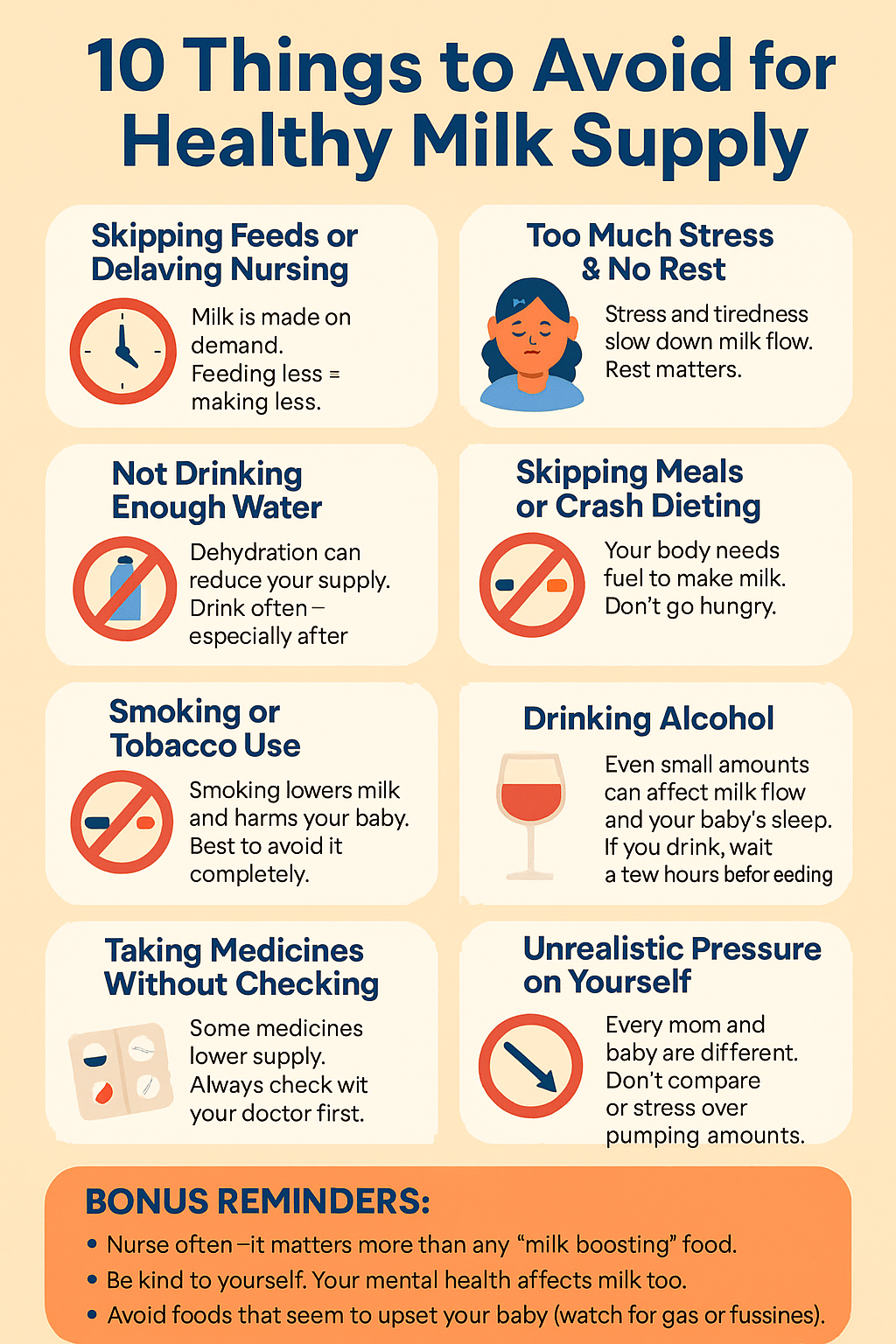By Nutriworld | Dt. Dipanwita Saha
Confused by “milk-boosting” foods? You’re not alone.
New moms often feel pressured to eat a long list of so-called “galactagogues” (a fancy word for milk-making foods), even ones they dislike. But do these foods actually help? And which ones are worth trying? Let’s separate fact from fiction so you can nourish your body without stress or guesswork.

What Are Galactagogues?
Galactagogues are foods or herbs that help boost breast milk. The word means “milk promoter” — from galacto (milk) and agogos (to lead or promote).
What Actually Matters Most?
Before we dive into superfoods, here’s the truth:
- Milk supply depends mostly on demand, hydration, and overall nutrition.
- Breastfeeding or pumping regularly sends signals to your body to keep producing milk.
- Staying hydrated and eating enough calories helps your body meet the demand.
- A balanced diet with protein, healthy fats, carbohydrates, and micronutrients keeps milk production steady.
According to the Academy of Breastfeeding Medicine (ABM), no single food is a magic solution—but some may support milk-making when part of a healthy routine.

[Always remember to consult any trained Dietetian or doctor for healthy outcomes.]
Do “Milk-Maker” Foods Really Work?
Let’s break down the hype and real facts behind some famous foods that promise to boost breast milk:
1. Fenugreek Seeds
Fenugreek is a natural galactagogue that helps stimulate and increase milk production in lactating mothers. The active compounds in fenugreek, such as diosgenin, a plant-based estrogen, are believed to mimic estrogen’s effects, supporting milk production.
⚠ Side effect: Can cause gas, sweet body odor (like syrup!), and may mess with thyroid in some moms.
2. Oats (Daliya/Rolled Oats)
Oats are healthy cereal grains. The active compound beta-glucan is a type of fiber that may help increase breast milk by boosting prolactin, the hormone that tells your body to make milk.
3. Moringa Leaves (Drumstick Leaf / Saijan Patta)
Moringa leaves are considered a galactagogue, containing flavonoids and polyphenols, that increase breast milk production. Fast results and super-nutritious– especially in Indian kitchens. Loaded with iron, calcium, Vitamin A & C = perfect for healing and nourishing new moms.
4. Garlic:
Garlic may help boost breast milk by supporting let-down and encouraging babies to nurse longer (thanks to its strong smell). It’s also great for immunity and healing after birth. Just eat it in moderation, as too much might upset your baby’s tummy.
5. Fennel Seeds (Saunf):
Fennel seeds have a compound called anethole, a plant estrogen that may pass into breast milk. Traditionally used to boost supply, some studies show it may improve milk volume and baby weight—but it doesn’t raise prolactin levels. Effects can vary by person.
6. Barley (Jau):
Barley contains beta-glucan, which may help boost prolactin and milk supply. Some studies suggest mild benefits, especially with barley malt. It’s safe while breastfeeding—unless you have celiac disease or a rare allergy. Always focus on overall care, not just galactagogues.
7. Sesame seeds :
Sesame seeds may help boost breast milk due to their calcium and plant-based estrogens. They also provide protein and healthy fats—great for milk flow and baby’s growth. Easy to add to meals, and tasty too.
8. Ginger :
Ginger is often used for nausea, but in some cultures, it’s also believed to boost milk supply. It contains active compounds like gingerol, which may help with lactation or ease breast engorgement. Effects may vary by individual.
9. Cumin:
Cumin seeds are used in India and Türkiye to support milk supply. They contain plant oils and flavonoids that may help, but there’s limited research. While generally safe, cumin shouldn’t replace expert advice if milk supply is low.
10. Coriander seeds :
Coriander seeds are used in traditional remedies to boost breast milk. They contain natural oils like linalool, which give a strong scent. Though commonly used, there’s no strong scientific proof, so it’s best used with proper breastfeeding guidance.
These can help, but won’t work like magic. Every mom’s body responds differently.
Quick Truths for New Moms:
- Nurse more, stress less.
- Eat what feels good.
- Hate laddoos? Don’t eat them.
- Guilt kills supply—food doesn’t fix that.
- No food is magic. You are.
- Calm mother = happy milk flow.
- Trust your body, not noise.
- Fed mom = fed baby.
Aside from foods, what really helps milk production?(Real Boosters Backed by Science)
- Skin-to-skin contact: Promotes oxytocin, the “let-down” hormone.
- Frequent nursing/pumping: More demand = more supply
- Hydration: Aim for 8–12 cups of fluids/day.
- Rest + Stress Management: Sleep and calmness matter.
- Nutrition: Protein-rich meals, iron, B12, DHA, calcium, and whole foods.

Pro tip: Drinking a glass of water every time you feed your baby is an easy way to stay hydrated.]
Conclusion : Trust your body, not the hype
Feeding your baby isn’t about finding a miracle food. It’s about trusting your body, nourishing it well, and tuning into what feels good and right for you.
The best “milk-boosting diet” is one that fuels you with joy—not pressure.
FAQs
1. Do I need to take lactation cookies or powders?
No, they’re optional. Some contain oats or brewer’s yeast, but a balanced homemade meal works just as well.
2. Can drinking milk help me produce more milk?
Not necessarily. You don’t need to drink milk to make milk. Focus on hydration and nutrition.
3. I hate fenugreek—what else can I try?
Oats, moringa, fennel, and garlic are good alternatives. Or skip galactagogues and focus on frequent feeding.
4. Is low milk supply always a food issue?
Not always. It can stem from poor latch, infrequent feeding, stress, or medical issues. Consult a lactation expert.
5. Can spicy food reduce my milk supply?
No, spices don’t reduce milk supply. Some babies may react to flavors, but it’s safe unless your baby shows signs of discomfort.
By, Priyanka Das Nutrition Content Writing Intern [ Nutri World ]
